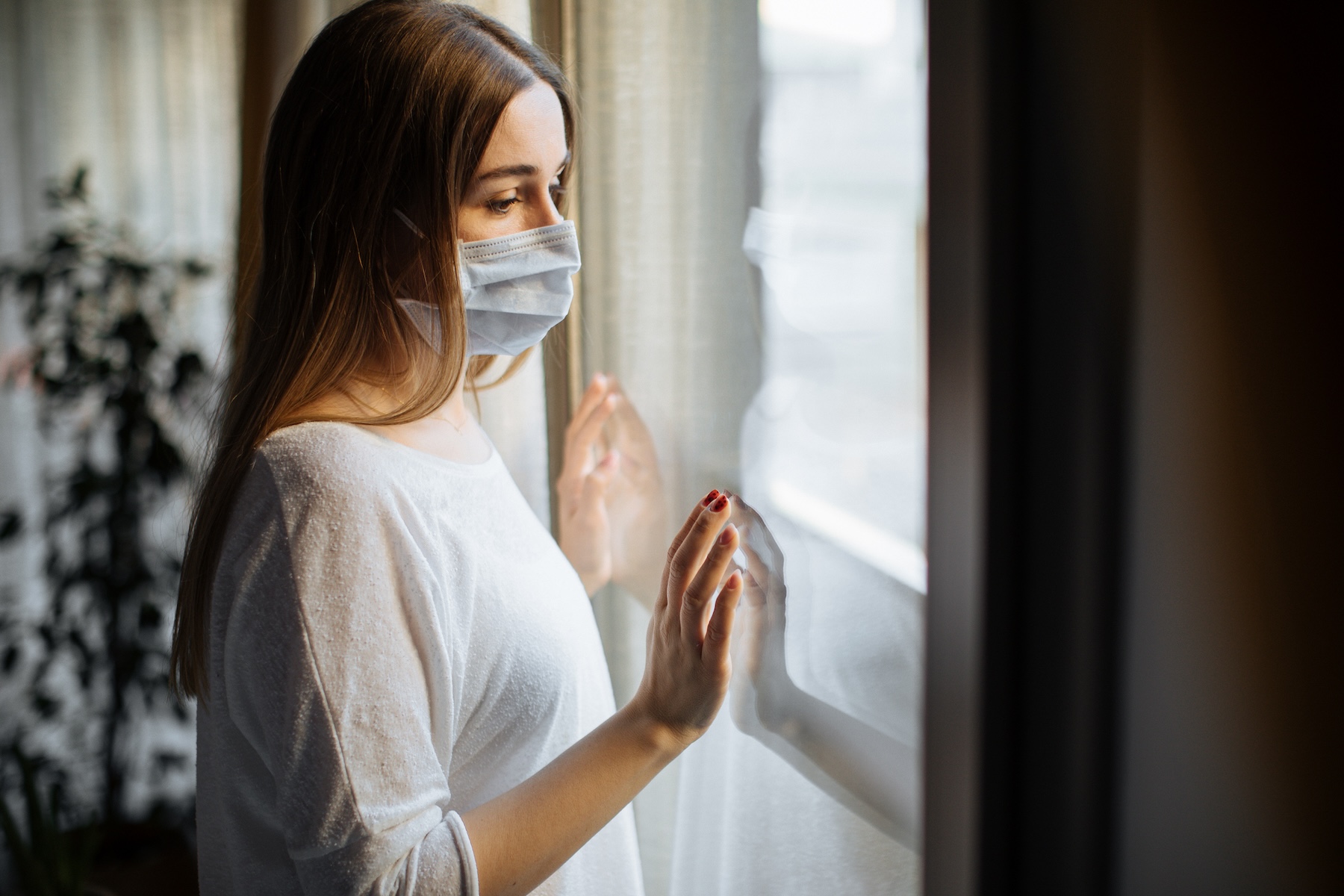Parenting teens can be hard. The COVID-19 pandemic made it even harder when it created or worsened mental health challenges in many adolescents.
Multiple studies from around the world have linked the COVID-19 pandemic to increased stress levels, depression, anxiety, insomnia, drug misuse, and other mental health challenges in adolescents. That impact did not subside when the pandemic ended.
If you’re worried that the COVID-19 pandemic may have left your teenager sad, anxious, socially isolated, impulsive, or rebellious, then this article is for you. Here we’re going to break down the research on how the pandemic left a lasting mark on teen mental health, then we’ll share practical tips you can do to help your teen recover.
Pandemic Factors That Impacted Teen Mental Health
You’re probably not in a hurry to relive the COVID-19 pandemic. But to understand the impact it has had on teen mental health, it’s helpful to consider some of the major stressors that affected our young people during that trying time. The following specific aspects of the pandemic negatively affected teen mental health:[i]
Forced social isolation. The need to isolate and social distance was hard on many of us, but for teens and adolescents, it was especially detrimental. That’s because social connectedness is developmentally critical during adolescence. It is a major part of establishing identity as an individual.
Fear of COVID-19. Teens experienced fear of contracting the virus, fear of passing the virus to vulnerable older relatives, and chronic worry about the health and safety of loved ones.
Uncertainty about the future. Families may have experienced economic hardship. Common teen jobs such as those in the service industry disappeared. Teens experienced concerns about the impact of remote learning on their academic achievement and opportunities for the future.
Missed celebrations of major life milestones. Teens missed out on longstanding traditions like graduation ceremonies, “Senior Night” recognition at extracurricular events, attending High School dances, and other rites of passage. These events are important for reflecting on personal accomplishments and the fact that they are growing up.
Increased reliance on technology. The need for increased technology use exacerbated excessive social media usage and its harmful effects on teens.
Pandemic-Related Mental Health Challenges in Teens
Studies have shown that anxiety and depression in youth have doubled worldwide since the start of the pandemic.[ii] The Centers for Disease Control and Prevention found that visits to the emergency room for behavioral health concerns, self-harm, chronic illnesses, and specific injuries increased after the start of the pandemic. In girls, in particular, emergency room visits for eating disorders and tic disorders tripled during the pandemic.
Multiple research studies in several countries have found that the COVID-19 pandemic is associated with an increase in these mental health challenges in youth:[iii]
- Greater stress levels
- Depression
- Anxiety
- Insomnia
- Drug misuse
Other studies have shown an increase in panic, somatizations, and self-injurious behaviors.[iv]
Lasting Impact of Pandemic-Related Mental Health Challenges
Studies have specifically explored whether the negative effects of the pandemic have faded as the world returned to normalcy post-pandemic. Unfortunately, the negative impacts on teen mental health have lingered. Teens continue to face social anxiety and social awkwardness, lack of endurance and stamina which affect their ability to set and achieve goals, and difficulty coping with uncertainty about the future.[v]
A study by the National Institute of Mental Health even found changes to brain structure in teens after the pandemic. Post-pandemic images of teen brains showed thinning of the cortex, which is associated with planning and self-control, reduced volume in the parts of the brain associated with regulating fear and stress, and changes that are typical in people who faced chronic adversity in childhood.[vi]
The Importance of Treatment for Teen Mental Health Issues
Some studies show that approximately one in seven adolescents has a mental health problem.[vii] Other studies have found that one in five teens are experiencing anxiety symptoms.[viii] Suicide is the second-leading cause of death in adolescents between the ages of 10 and 14 and the third-leading cause of death between the ages of 15-24.[ix]
Adolescence has always been a sensitive developmental stage, and the majority of mental health challenges first appear during adolescence.
Left untreated, adolescent mental health challenges are associated with:[x]
- Physical health complications
- Adverse academic consequences
- Negative social outcomes
- Higher rates of drug misuse
- Self-harm
- Suicide
- Adult mental health challenges
The good news is that teen mental health challenges can be treated with effective, evidence-based therapy. [xi]
Steps You Can Take to Help Your Teen
Peter Faustino, president of the National Association of School Psychologists, identifies steps for helping teens recover from the trauma of the pandemic:[xii]
Consult with teachers and school counselors. If you suspect your teen may be struggling, reach out to your child’s school. They may be able to suggest strategies that can benefit your child.
Offer emotional support. Listen to your teen and talk to them about how to cope with anxious thoughts.
Encourage socialization. If possible, help your child make healthy social connections and encourage them to socialize.
Help your teen to challenge unhelpful thoughts. Try to help your child identify, “Is this thought helpful?” And, “Is there another thought I can replace that with?” or “Can I move on to something else?”
Encourage healthy routines. Support your child in exercising regularly, getting fresh air, and prioritizing sleep. Caring for the mind and body can help improve mental and physical health.
Seek therapy. Teen mental health challenges can be treated with therapy. Therapists are trained to help teens process difficult emotions and reframe unhelpful thoughts. The evidence of measurable brain changes suggests that teens would benefit from professional help with emotion regulation and cognitive processes, two areas of functioning that are affected by pandemic-related brain changes.[xiii]
Signs You Need to Seek Therapy For Your Teen
If you think your teen may be struggling with their mental health, we strongly encourage you to seek therapy. Early treatment is most effective and may also prevent mental health issues later on.[xiv] Here are common signs that indicate that you should seek therapy for your teen:
- Loss of interest in things they once enjoyed
- Low energy
- Sleeping too much or too little
- Avoiding socializing or spending time with friends and family
- Weight changes
- Preoccupation with weight or exercise
- Self-harm behaviors
- Smoking, drinking alcohol, or using drugs
- Engaging in risky or destructive behavior
- Having thoughts of suicide
Managing Your Own Feelings of Self-blame or Fear of Stigma
It can feel extremely stressful, exhausting, and frightening to see your child struggling with their mental health. There’s an old saying that “You’re only as happy as your unhappiest child.” So, if your child is struggling to get out of bed, turning down favorite activities, having angry outbursts, or feeling so nervous and overwhelmed that they’re missing school and activities, it makes sense that you may feel overwhelmed and taxed.
And, we adults are not immune to unconsciously comparing our lives to the carefully curated lives portrayed by others on social media. It can be easy to get the sense that your child is the only one whose anxiety or depression is interfering with daily life. Fear and doubt can slip in and leave you blaming yourself, wondering where you went wrong in your parenting and why your child is suffering while other teens appear to thrive.
We want you to know that your teen’s mental health struggles are not your fault. The pandemic was an extremely challenging and stressful period for us all. Many factors affect how severely adversity will impact each individual. Blaming yourself though, can make it feel harder to reach out to get your child the support that can help them cope.[xv]
No matter how it may seem, your child is not the only teen who is struggling with mental health challenges. Anxiety and depressive symptoms in teens doubled during the pandemic.[xvi] 20% of youth report significant anxiety symptoms today.[xvii] That’s one in every five adolescents.
We also want you to know that you don’t have to help your teen on your own. It’s awesome that your teen has you. Our compassionate, licensed therapists can also be a support to both you and your teen.
You Don’t Have To Do This Alone: Benefits of Therapy for Teens Struggling Post-Pandemic
Deciding to reach out for therapy for your teen may feel scary at first, but you may also experience a great sense of relief. If you’ve tried waiting it out but your teen has not bounced back, or if you’ve tried offering your teen support and coping strategies on your own, you may find that getting professional help reduces the immense sense of pressure on you.
The first step you can take is to call our office and schedule a consultation. We will listen to your concerns and pair your teen with a caring licensed therapist. Teen counseling and family counseling can both be effective options for addressing teen mental health concerns.
Benefits of Online Therapy for Teens
If there is a silver lining to the extreme challenges that we faced during the COVID-19 pandemic, it may be the increase in the availability of effective online therapy. Online therapy can remove the burden of arranging transportation, especially for teens who may not be driving yet. It eliminates travel time before and after appointments, allowing you and your teen to keep up with other demands of daily life.
Online therapy can reduce time on waitlists since you can connect with qualified therapists outside your local area. And, online therapy can offer even more privacy as you don’t have to walk into an office on a busy street or sit in a public waiting room.
In some studies, teens report feeling more open to sharing in an online therapy setting. This can also make it feel easier for teens to keep regular appointments.[xviii]
Research shows that online therapy is just as effective as in-person therapy, and it may feel more comfortable and manageable.
We’re Here for You
Whether your teen is struggling with anxiety, depression, social anxiety, isolation, anger, or other mental health symptoms, our team of compassionate and nonjudgmental therapists is here to help. Our approachable and relatable counselors can teach your teen effective coping strategies and skills for managing life’s challenges and difficult emotions. We’re here to support your teen, and we’re here to support you.
References
[i] “The Impact of COVID-19 on the Mental Health of Our Youth | Ipsos,” January 30, 2024, https://www.ipsos.com/en-us/impact-covid-19-mental-health-our-youth.
[ii] “The Impact of COVID-19 on the Mental Health of Our Youth | Ipsos.”
[iii] Anwar A Sayed et al., “The Effects of COVID-19 on the Mental Health of Children and Adolescents: A Review,” Cureus 16, no. 3 (n.d.): e56473, https://doi.org/10.7759/cureus.56473.
[iv] “Are Older Teens More Frustrated than Younger Teens by the Covid-19 Restrictions? The Role of Psychological Maturity, Personality Traits, Depression and Life Satisfaction. – EBSCO,” accessed March 29, 2025, https://research-ebsco-com.oh0142.oplin.org/c/kpurfj/viewer/html/jdgneixtlb.
[v] “The Impact of COVID-19 on the Mental Health of Our Youth | Ipsos.”
[vi] “COVID-19 Pandemic Associated With Worse Mental Health and Accelerated Brain Development in Adolescents – National Institute of Mental Health (NIMH),” January 26, 2023, https://www.nimh.nih.gov/news/science-updates/2023/covid-19-pandemic-associated-with-worse-mental-health-and-accelerated-brain-development-in-adolescents.
[vii] Sayed et al., “The Effects of COVID-19 on the Mental Health of Children and Adolescents.”
[viii] Lisa R. Fortuna et al., “The Impact of COVID-19 on Anxiety Disorders in Youth,” Child and Adolescent Psychiatric Clinics of North America 32, no. 3 (July 2023): 531–42, https://doi.org/10.1016/j.chc.2023.02.002.
[ix] “Suicide – National Institute of Mental Health (NIMH),” accessed March 31, 2025, https://www.nimh.nih.gov/health/statistics/suicide.
[x] Sayed et al., “The Effects of COVID-19 on the Mental Health of Children and Adolescents.”
[xi] Sayed et al.
[xii] “Study Shows How Pandemic Affected Teen Boys and Girls Differently – EBSCO,” accessed March 29, 2025, https://research-ebsco-com.oh0142.oplin.org/c/kpurfj/viewer/html/yorhttmfhj.
[xiii] “COVID-19 Pandemic Associated With Worse Mental Health and Accelerated Brain Development in Adolescents – National Institute of Mental Health (NIMH).”
[xiv] “Child and Adolescent Mental Health – National Institute of Mental Health (NIMH),” December 12, 2024, https://www.nimh.nih.gov/health/topics/child-and-adolescent-mental-health.
[xv] Lynn McKeague et al., “Parenting an Adolescent Who Is Using a Mental Health Service: A Qualitative Study on Perceptions and Management of Stigma,” Journal of Family Issues 43, no. 9 (September 1, 2022): 2317–38, https://doi.org/10.1177/0192513X211030924.
[xvi] Fortuna et al., “The Impact of COVID-19 on Anxiety Disorders in Youth.”
[xvii] Fortuna et al.
[xviii] “The Impact of COVID-19 on the Mental Health of Our Youth | Ipsos.”



